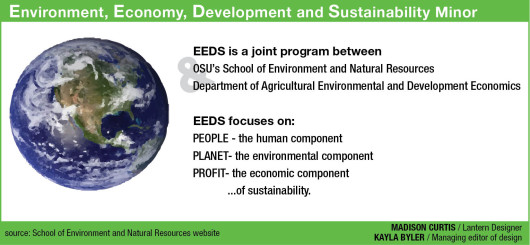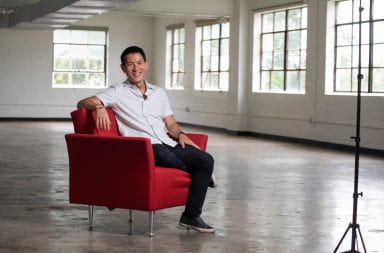
Ohio State is allowing students of all majors to pursue sustainability studies with the creation of a new minor.
A minor in Environment, Economy, Development and Sustainability will become available for students to pursue starting Spring Semester, though those interested can add the minor now, after the program made its debut as a major Fall Semester 2012. According to the program website, the EEDS major “provides the core knowledge and skills students need to launch a career in sustainability in the private, public or non-profit sectors.”
Sustainability involves human and natural systems and the ability to “manage change, think holistically and assess sustainable development in a variety of settings,” according to the EEDS website.
Neil Drobny, program director of EEDS, said the minor is a five-course sampling of the major that gives students in other majors a chance to gain valuable knowledge about the subject.
“Sustainability is on the lips of everybody these days, especially employers,” Drobny said. “I expect (the EEDS minor) to become very popular.”
Drobny said it would be valuable for students of any major to look into the new minor.
“When interviewers hear ‘sustainability,’ their eyes light up,” Drobny said. “Sustainability experience broadens someone’s career path in any company. For example, if you’re in purchasing, you can keep an eye on the suppliers you’re buying from. Consumers want to know where you sourced your raw materials, and how green the production is.”
Drobny said businesses are driving sustainability efforts in the U.S.
Walmart is one example, he said. The company puts pressure on its suppliers for more sustainability — smaller energy and materials costs on that end can lead Walmart to sell products at lower prices.
“Sustainability is becoming crucial for a business to survive,” Drobny said. “Not only is there a growing consumer base who cares about sustainability, but it helps with a company’s costs.”
Sam Christman, a first-year in business, said he has reasons beyond job prospects to pursue an EEDS minor though.
“The environment as a whole is in a fragile state. The actions of my generation will play a monumental impact on what our Earth will be like down the road. Transforming business practices and energy consumption uses, among other things, are two of the most relevant and looming questions we as a human race have,” Christman, who plans to pick up the minor, said in an email.
Although students must take at least one of their EEDS minor courses in business, Bill Leonard, a first-year in design, said he thinks the minor is relevant for all.
“Sustainability in design is the next step. Resources are dwindling, and current recycling plans, while a step in the right direction, aren’t effective enough,” Leonard said in an email. “Taking (EEDS) in tandem with industrial design will allow me to consider the environmentally conscious approach and the design in one fell swoop.”
Drobny said the process to add the minor started toward the end of Spring Semester and it was approved in September. The university was able to add the EEDS minor with minimal cost and without the need to hire new faculty or courses.
“We (the university) are a producer. Adding the minor is an investment for more sustainable products. The products are students. We want to produce more sustainability-savvy students — that’s what employers want,” Drobny said.


